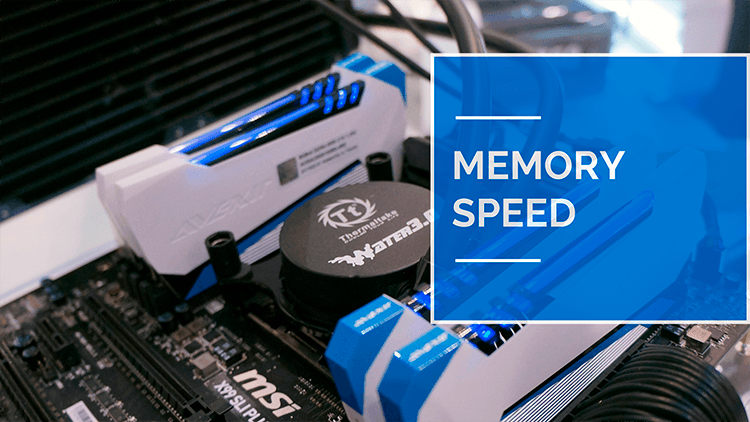How vital is your RAM speed to your overall computer experience? Memory modules are normally judged by their two most significant parameters, size and speed. We are in pursuit of finding whether these two aspects play a major role in the overall performance of your system.
Types of Ram
The modern form of solid state memory known as Random Access Memory was first invented in 1968 by Robert Dennard. The original makeup now has common variations such as DIMM, RIMM, SIMM, SO-DIMM, and SO-RIMM. DIMM is the common type of computer memory module found in desktops, where it is installed in one of the memory slots on your motherboard. The question behind RAM is if its speed and quantity are vital to the performance of your system?
An Explanation
Computer memory has a ring to it that just makes it sound like it’s the heart and soul of your system, when really, it isn’t necessarily. Memory is necessary for any computer system, but in terms of performance, the CPU, graphics cards, and other main components play a larger role in determining strength of your computer itself. The size of the available memory is more for the use of multiple applications along with heavy traffic. Different motherboards and processors support different speeds of memory, depending on the chipset and generation.
For example, Intel Skylake processors officially support DDR4 memory with speeds up to 2133MHz. However, the ASUS Z170 PRO GAMING motherboard, which is designed for Skylake processors, supports memory speeds up to 3400MHz. If the Intel processors only support speeds up to 2133MHz, why do motherboards support faster speeds, and why do memory manufacturers make memory with these faster speeds? The 2133 speed that Intel lists is only the officially supported speed. Faster memory will work just fine, but will faster memory, like DDR4-2400 improve the performance of your gaming PC over DDR4-2133 memory?
They also say that more memory is always better. More gigabytes of RAM means you can have more tabs open in your browser and more applications running without bogging down your system. But does having more memory improve gaming performance?
Putting it to the Test
Elaborating on why your RAM size and speed are vital is nearly impossible with the research that has been done on the topic. The reason for this is because every study leads to the same conclusion, it doesn’t really matter. Over at the Tech Buyer’s Guru they threw together a study to help some pc users hopefully clear up confusion and possibly save some money. Their test consisted of comparing 4gb of and 8gb of RAM. They performed these tests using an Intel Core i5-4670K, Asus Z87 Gryphon motherboard, Sapphire Radeon HD7870 2GB video card, Corsair 2x4GB or 1x4GB DDR3-1600 RAM, and Windows 8 x64. After running tests using one or two sticks of DDR3 RAM running at 9-9-9-24 settings (the lower the numbers the better the timings), which was attempting to expose the 4gb as a weaker fit, it did the opposite of what was expected. 4gb of ram was actually more efficient than the 8gb in all six instances of testing. This doesn’t mean that each of us should downsize our RAM storage on the spot, the tests only averaged about a 1-3% increase from the 8gb, and if you want to be safe, buy the bigger size. Running multiple applications calls for a need of extra quantity and you may want to take the insurance.
While Tech Guru may have compared the quantity of the RAM, TECHSPOT did their own test on the importance of memory speed. They took some G.Skill TridentZ 8GB (2x4GB) DDR4-4000 and applied it with applications comparing the Core i7-6700K at various (limited) memory speeds ranging from 2133 MT/s up to 4000 MT/s. In their memory bandwidth benchmark test they found that the increased memory speed did produce returns of about 20% when compared to slower speeds,, but results diminish towards the higher end speeds. When it comes to applications such as Adobe Photoshop, the faster memory did prove to be the best contender, where the 4000Mhz memory finished a workload almost a second faster than 3600MHz and 8 second faster than 2133Mhz. Lastly, they covered gaming where the ultimate results were still good, but not significant enough to purchase the more expensive memory.
Conclusion
Do you really need the highest regarded memory card on the market to keep a top of the line system running correctly, probably not. Focusing on the other main components of your computer as mentioned earlier is a wise move that will keep the heart and soul of your computer as happy and as healthy as can be. So, save yourself some money and make sure to focus on the true purpose of your gaming pc when purchasing, graphics performance! If you’re truly looking to make an upgrade to your system, look into purchasing anything from cooling fans to better graphic cards, that money can be spent better elsewhere than trying to upgrade your RAM speed, which as we just found out, has minimal difference in the pc world.
